 In general dentistry, dental sealants can help ensure good dental health in children. The protective layer can also extend up to adulthood. This gives patients the opportunity to enjoy strong teeth without worrying about dental damage. If you want to know how general dentistry makes use of dental sealants, here are the details.
In general dentistry, dental sealants can help ensure good dental health in children. The protective layer can also extend up to adulthood. This gives patients the opportunity to enjoy strong teeth without worrying about dental damage. If you want to know how general dentistry makes use of dental sealants, here are the details.
How sealants work
Chewing and biting surfaces of teeth are vulnerable to wear. They are also prone to bacterial gathering. In the right conditions, bacteria turn into plaque. These microorganisms release acids to the surface of teeth. The acids eat away the enamel and into the tooth, forming cavities.
The general dentistry treatment of applying dental sealants aims to protect the biting and chewing surfaces of teeth. This substance is clear plastic. The dentist will paint the sealant over the grooves and pits of the crown one layer at a time. The liquid form of the sealant will pour into the indentations and crevices. The dentist will then complete the general dentistry treatment by hardening the sealant with a curing light.
Children and teens benefit the most from dental sealants. The sealant layer is thin. After the procedure, the sealants will not be visible at all. The dentist will not change the natural structure of the tooth at all. It will not cause pain.
Dental sealants can also apply to adults. Those who are serious about having healthier teeth can get this general dentistry treatment. The molars often get food particles and bacteria stuck between grooves and crevices. Dental sealants prevent substances from touching the surfaces of these teeth. Sealants can last for up to 10 years with proper care and maintenance. The dentist can reapply the sealants as the patient needs them.
How dentists use dental sealants
General dentistry practices recommend dental sealants for children whose primary teeth just erupted. New teeth are prone to bacterial infection. Dentists want to use dental sealants to ensure the oral health of children while growing up. Routine dental checks allow the dentist to check for other new teeth in need of sealants. Teens and adults can also have dental sealants after some repairs.
The process starts by cleaning the molars. Then, the dentist will dry the teeth. An abrading gel will help the sealants stick to the teeth. A thorough rinsing will follow. After drying the molars, the dentist will paint the dental sealants onto the teeth. The dentist will make sure all the pits, crevices, and grooves have coatings of sealant.
The ideal care
Dental sealants will become more effective with proper care and maintenance. Brushing teeth two times a day and flossing before bedtime can remove plaque and food particles. Rinsing with an antibacterial mouthwash helps protect the teeth from bacteria as well. The dentist will check them during each routine appointment and reapply if the patient needs a fresh coating.
A general dentistry treatment like dental sealants can protect young and mature teeth
Molars are prone to wear and decay because of their grooves and pits. The general dentistry treatment of applying sealants can shield the oral health of children, teens, and adults. Your dentist will perform a proper dental check to see if you are a good candidate for the treatment. Good daily oral care will help maintain the optimal condition of your sealants.
Request an appointment or call Assembly Dental at 857-300-5779 for an appointment in our Somerville office.
Related Posts
Many are familiar with how sugar can affect overall health, but fewer are familiar with why general dentistry practices recommend avoiding sugar. Sugar can have a negative impact on oral health and the appearance of your smile. This article discusses exactly why sugar is potentially harmful to the teeth and gums.The following is everything to…
Wondering how a damaged tooth can be treated? Read on to learn how general dentistry addresses damaged teeth. A damaged tooth can result from a blow to the mouth, bruxism, and a range of other causes. There are several ways a general dentist can restore the health, appearance, and function of a damaged tooth. This…
General dentistry practitioners know that loose teeth in youngsters are common and cause little worry since the problem is with the "baby teeth." If you have a loose tooth or one of your children has a loose adult tooth, you may need to visit the general dentistry office to save it. Continue reading to discover…






